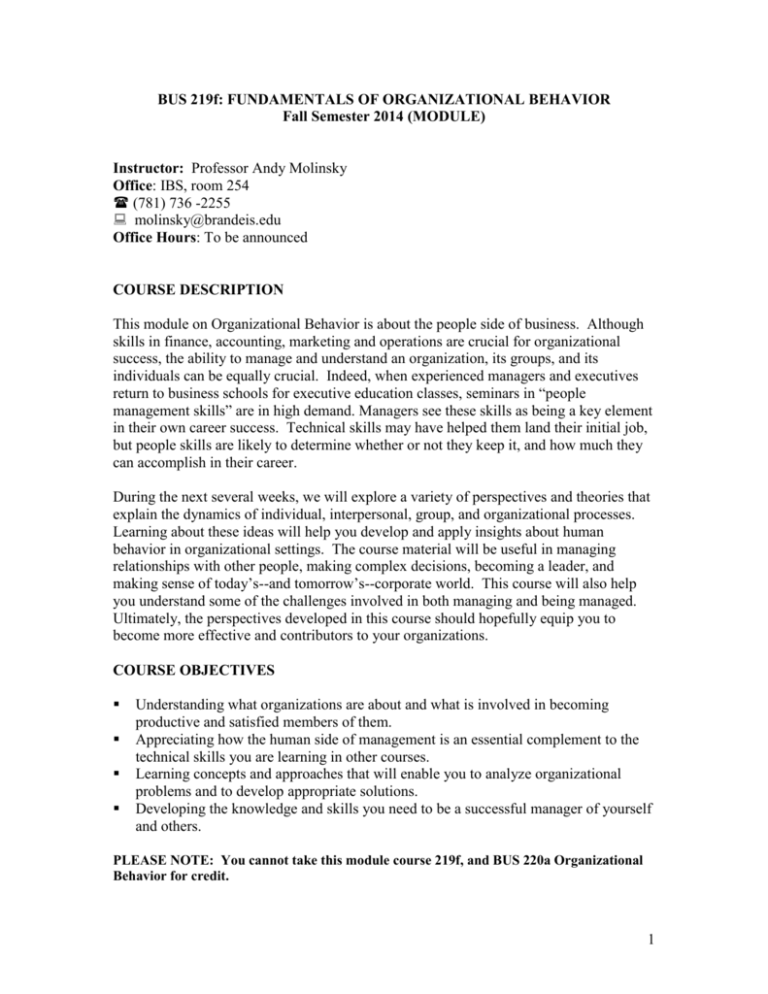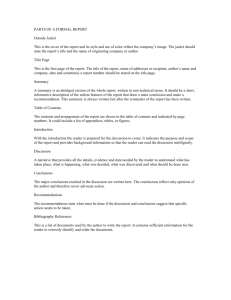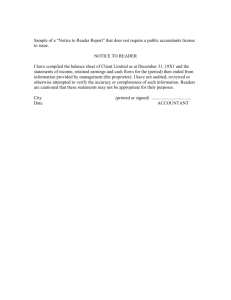BRANDEIS UNIVERSITY
advertisement

BUS 219f: FUNDAMENTALS OF ORGANIZATIONAL BEHAVIOR Fall Semester 2014 (MODULE) Instructor: Professor Andy Molinsky Office: IBS, room 254 (781) 736 -2255 molinsky@brandeis.edu Office Hours: To be announced COURSE DESCRIPTION This module on Organizational Behavior is about the people side of business. Although skills in finance, accounting, marketing and operations are crucial for organizational success, the ability to manage and understand an organization, its groups, and its individuals can be equally crucial. Indeed, when experienced managers and executives return to business schools for executive education classes, seminars in “people management skills” are in high demand. Managers see these skills as being a key element in their own career success. Technical skills may have helped them land their initial job, but people skills are likely to determine whether or not they keep it, and how much they can accomplish in their career. During the next several weeks, we will explore a variety of perspectives and theories that explain the dynamics of individual, interpersonal, group, and organizational processes. Learning about these ideas will help you develop and apply insights about human behavior in organizational settings. The course material will be useful in managing relationships with other people, making complex decisions, becoming a leader, and making sense of today’s--and tomorrow’s--corporate world. This course will also help you understand some of the challenges involved in both managing and being managed. Ultimately, the perspectives developed in this course should hopefully equip you to become more effective and contributors to your organizations. COURSE OBJECTIVES Understanding what organizations are about and what is involved in becoming productive and satisfied members of them. Appreciating how the human side of management is an essential complement to the technical skills you are learning in other courses. Learning concepts and approaches that will enable you to analyze organizational problems and to develop appropriate solutions. Developing the knowledge and skills you need to be a successful manager of yourself and others. PLEASE NOTE: You cannot take this module course 219f, and BUS 220a Organizational Behavior for credit. 1 READING MATERIALS Required readings, which are to be completed before arriving to class, are included in one of the following two sources: (1) Textbook: Organizational Behavior, 15th Edition. Stephen P. Robbins and Timothy A. Judge. Prentice Hall. [Note: You may use older editions, or the international edition, but beware: the page numbers and chapter numbers will not always correspond with the 15th Edition. So, you should take great care to make sure you are reading the correct material by comparing your older edition to the 15th Edition. If possible, I would suggest using the 15th Edition.] (2) Course reader: Available at the Brandeis Bookstore. (3) MBTI/Myers Briggs Test: Available at the Brandeis Bookstore (to be completed and brought into class for the second session) COURSE REQUIREMENTS Requirements for the course include: (1) Class attendance and participation (40%) (2) Final group project (35%) (3) Final group presentation (25%) 1) ATTENDANCE, INVOLVEMENT, PARTICIPATION (40%) An important course requirement is active involvement in class discussion. Because discussion is a substantial part of the course, student participation is essential — for both your own learning and that of the other students. Attendance will be taken at the beginning of each class. All missed classes will be noted. Habitual lateness (or leaving class early), for whatever reason, will be noted as evidence of low course commitment and will be penalized. Students are expected to attend every class session having read and thought about the assigned material. Students should always be prepared to contribute to the class discussions, demonstrating their preparation by asking questions whenever necessary and by integrating the vocabulary and concepts from the readings into their class comments. If you will be absent, please email your professor before class. Class discussions provide the opportunity to practice speaking and persuasive skills, as well as the ability to listen. Effective class comments may address questions raised by others, integrate material from this and other courses, draw on real-world experiences and observations, or pose new questions to the class. High-quality participation involves 2 knowing when to speak and when to listen or allow others to speak. Comments that are repetitive, unrelated to the current topic, disrespectful of others, or without sufficient foundation are discouraged and will be evaluated negatively. The best class comments: • make or raise issues that are relevant to the current focus of the class; • show curiosity and a willingness to experiment; • use data or examples to support conclusions; • take into consideration the ideas already offered by others; • offer support for arguments; or • help others feel safe about participating. * Note: For one of the classes, you need to write a 1-page paper to hand in at the beginning of class as a reaction to your reading. This paper will be graded pass/fail and will factor into your participation grade. 2) FINAL GROUP PAPER (35%) Many of the theories and perspectives that we will focus on this semester are based on research conducted in the United States. However, organizational behavior is, of course, practiced around the world. In a group, you will prepare a final paper comparing organizational behavior in a different country to organizational behavior in the United States. These groups will be created by me and will consist of 2-4 students. There are three parts of the paper. Part I: Core dimensions of cultural difference For the first part of the paper you will present an overall, general analysis of core dimensions of difference between the United States and the country you have chosen to focus on. For this, you will use one or more of the following frameworks: 1) Hofstede’s cultural dimensions theory 2) Project Globe’s cultural dimensions 3) Trompenaars’ dimensions of cultural difference 4) Another framework for understanding cultural differences that you find and like in the literature (please show to me first before using) You can learn about Hofstede and Project Globe in your course book. You can learn about Tompenaar’s work in the following book: Riding The Waves of Culture: Understanding Diversity in Global Business (1997). There are also many useful sources of information about these perspectives on the internet and I also have books in my office that you can come by and take a look at to better understand cultural dimensions frameworks. We will talk more in class about how exactly you will present this cultural information. Part II: Specific aspects of Organizational Behavior 3 You will then choose 3-5 different aspects of organizational behavior (for example: leadership, motivation, communication, decision making) to compare across the two cultures. For example, if you choose communication as one of your dimensions, and Germany as your country, you might describe how the communication style in Germany is different from the US, why it is different from the US style, and how it might impact interactions between German and American people at work. You will do this for all the dimensions of organizational behavior you choose to focus on. These can be dimensions we talk about in class, or dimensions in your book that we don’t talk about. For this part of the project, you should consult with a range of different resources: internet, books about cultural differences, and interviews with natives from each of the cultures. You can and should include stories, examples and quotations from native-born employees and managers familiar with the situations you’re focusing on in your paper. Really work hard to make these differences “come alive” in your paper. Part III: Illustrative scenarios of cultural misunderstanding The final part of the paper is a series of illustrative scenarios that you will create to illustrate the differences for the reader. These scenarios should follow the following format: You will start with a short story about someone from one of the two cultures trying to interact in a particular organizational behavior situation in the other culture, but somehow struggling or making key errors (you will create a separate vignette for each dimension of organizational behavior you focus on). I will give you some examples of these types of stories in class. At the end of your story, you will pose a question to the reader about what went wrong or what critical mistake the person in the story made. This may be an open-ended question or a quiz question where the reader needs to choose from various options. Finally, at the end of each story, you will provide an answer to this question for the reader, explaining what the dilemma was in the story, what the cultural mistake was and why the person committed it. (3) FINAL GROUP PRESENTATION (25%) You and your group will then present your findings and insights during an in-class presentation. The presentation will be 15-20 minutes long (with Q&A included). The presentation will be graded both for content and for style and details for this will also be provided in class. The presentation and paper are group assignments and everyone will receive the same group grade. However, I reserve the right to alter individual grades on the group projects in certain circumstances (e.g. when it is clear to me that an individual clearly did not contribute to the project in a consistent and meaningful way). 4 OTHER IMPORTANT INFORMATION 1) ACADEMY INTEGRITY Academic integrity is central to the mission of educational excellence at Brandeis. Each student is expected to turn in work completed independently, except where assignments specifically authorize collaborative effort. It is not acceptable to use the words or ideas of another person - be it a world class philosopher or your lab partner - without proper acknowledgement of that source. This means that you must use footnotes and quotation marks to indicate the source of any phrases, sentences, paragraphs or ideas found in published volumes, on the internet or created by another student. Violations of the University policies on academic integrity, described in Section Three of Rights and Responsibilities, may result in failure in the course or on the assignment, or in suspension or dismissal from the University. If you are in doubt about the instructions for any assignment in this course, it is your responsibility to ask for clarification. Please consult the following webpage if you have any questions: http://www.brandeis.edu/studentlife/sdc/ai/ 2) FORMAT OF ASSIGNMENTS All written assignments must be double-spaced, 12 point font, 8.5 x 11 inch paper. 3) RETURN OF GRADED PAPERWORK Returned paperwork, unclaimed by a student, will be discarded after 4 weeks and, hence, will not be available should a grade appeal be pursued by a student following receipt of his/her course grade. Grade appeals must be made in writing. 4) DISABILITY If you are a student with a documented disability on record at Brandeis University and you wish to have a reasonable accommodation made for you in this class, please see me immediately. Please keep in mind that reasonable accommodations are not provided retroactively. 5 COURSE OUTLINE Aug 28 Overview of Organizational Behavior No readings or assignments UNDERSTANDING INDIVIDUALS Sept 2 Personality/Individual Differences Reading: Chapter 2 -- p.44-56 only (about Biographical Characteristics); Chapter 5 (entire chapter) Assignments: Complete Myers-Briggs (MBTI) and bring to class Sept 4 Perception and Decision Making Reading: Chapter 6; plus: “They Saw a Game” and “Decisions” in course reader UNDERSTANDING INTERPERSONAL PROCESSES Sept 9 Motivation Reading: Chapter 7 Sept 11 Negotiation Reading: Don’t Bargain Over Positions; Getting Past No (in course reader) Sept 16 Interpersonal Communication Reading: “The Power of Talk” (in course reader) Sept 18 Case study: Rob Parson at Morgan Stanley Reading: Rob Parson at Morgan Stanley; The Firm-wide 360 Performance Evaluation Process at Morgan Stanley (in course reader) Assignment: Think about the following questions and be prepared to answer them in class a) What is your assessment of Rob Parson’s performance? Should he be promoted? b) If you were Paul Nasr, how would you plan to conduct the performance appraisal conversation? What would your goals be? What issues would you raise and why, and how would you raise them? 6 c) If you were Rob Parson, how would you conduct yourself in the performance evaluation meeting? What are your goals? Be prepared to role-play the appraisal conversation in class as either Nasr or Parson. UNDERSTANDING GROUPS & ORGANIZATIONS Sept 23 Workshop Session on your Final Project This will be a workshop session about your final project. Be prepared to offer the class a short summary of your project as well as 1-2 specific questions for the class. Each group will have a chance to present. Sept 30 Case Study: Carter Racing Reading: Carter Racing (in course reader) Assignment: Write 1 page answer to the following question and bring to class: 1) Would you race? Why? Why not? Oct 2 Organizational Culture Reading: Uncovering the Levels of Culture; Starbucks (in course reader); Chapter 16 Oct 7 Orit Gadiesh at Bain & Co. Reading: “Orit Gadiesh: Pride at Bain & Co” (in course reader) Assignment: Write 1 page answer to the following 2 questions (to be handed in at class): a. Describe and evaluate Orit Gadiesh’s leadership style. What are her strengths and weaknesses? b. What speech should she give? Why? Oct 13 Group Presentations Oct 14 Group Presentations & Course Wrap Up *** Final papers due at end of last session; PPT slides to be emailed to me as well on last day *** 7 8





